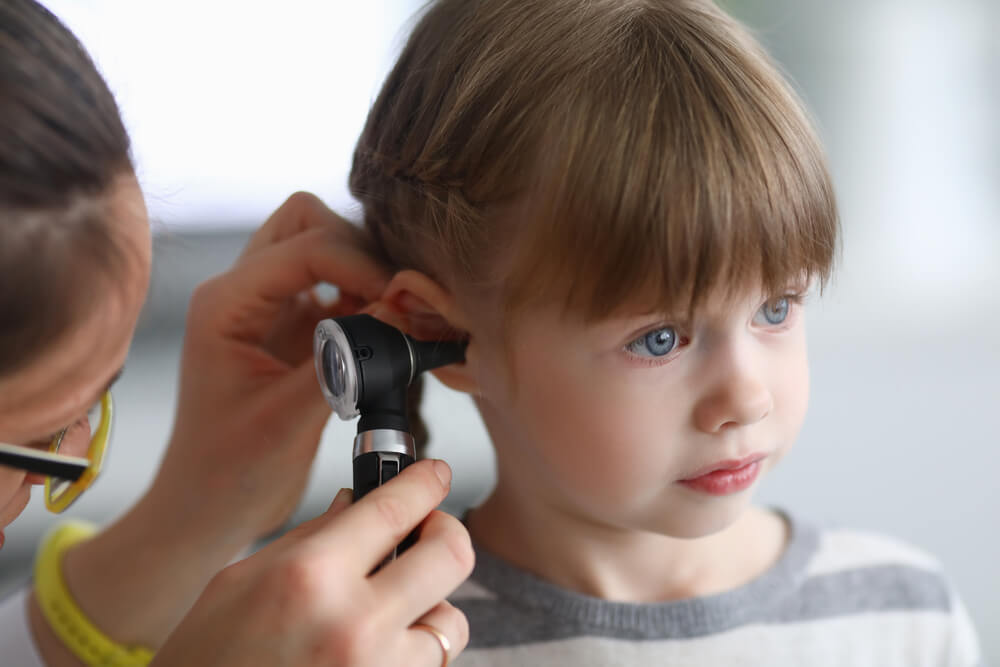Typically, ear infections occur when bacteria or viruses enter the space behind the eardrum (the middle ear). In the case of otitis media in children, the affected middle area fills up with infected fluid (pus), which causes pressure (pushes) the eardrum, causing pain.
Fortunately, there are several effective middle ear infection treatment options available. And if you are looking for exceptional general pediatric care in Plantation and Doral, Florida, you can rest assured that the expert team at Worldwide Pediatrics can help you and your toddler treat ear infections.
Symptoms of Otitis Media

Typically, ear pain is the most prominent sign of the problem, but some kids might also experience the following symptoms:
- Trouble sleeping
- Decreased appetite
- Trouble drinking
- Trouble sucking and chewing
- Lying down can be painful as it leads to pressure changes in the infected area
Older children will often complain about ear pain. If left untreated, the pressure builds up in the middle ear and may rupture the eardrum, leading to leakage from the ear. Symptoms of a ruptured eardrum in children may include nausea, dizziness, buzzing, and ringing in the ear.
Causes of Middle Ear Infections
As mentioned above, an ear infection usually occurs because of swelling on either one or both eustachian tubes that connect the middle ear to the throat’s back. These tubes enable mucus to drain to the throat from the middle ear.
When these tubes swell from allergies, acid reflux, throat infections, or a common cold, the mucus is blocked and can’t be drained, enabling bacteria and viruses to thrive in the mucus, creating pus, which then tends to build up in the middle ear.
When discussing ear infections, experts usually refer to otitis media rather than otitis externa or swimmer’s ear.
Children (most often between the ages of two and four) usually develop otitis media more often than adults because of the following:
- Their eustachian tubes are shorter and more horizontal, allowing viruses and bacteria to enter the area more easily. The tubes are also narrower, meaning that even minor swelling can block them.
- They have larger adenoids beyond the nose, which can interfere with the function of these tubes.
It’s also worth mentioning that otitis media isn’t contagious, but the reasons behind them (like colds) are. This means that ear infections in children are more prevalent during colder months when most people deal with upper respiratory tract problems. This is why most ear infections in children are also accompanied by common cold symptoms such as a cough and a stuffy or runny nose.
How Long Does Otitis Media Last?
Fortunately, these infections will often resolve on their own in the span of two to three days without the need for treatment.
Still, there are cases when the fluid remains in the middle ear even after the infection is over. And if this lasts for longer than three months, the condition might require treatment.
Establishing a Diagnosis
Most often, pediatricians will perform a physical exam and take a closer look at the ear with an otoscope. This small medical instrument looks like a flashlight and enables the providers to see the eardrum better.
Middle Ear Infection Treatment
Treating otitis media may include several different methods based on the following factors:
- The frequency of recurring ear infections in the child
- The severity of the infection and its type
- How long the infection lasted
- Other risk factors
- The child’s age
- Whether the infection interferes with hearing or not
Because most of these infections resolve on their own, not all children will need to take antibiotics. Many experts take a “wait-and-see” approach initially. They might prescribe pain-relieving medicine without antibiotics at first and wait to see if the infection resolves.
Also, antibiotics might not help when the cause of the infection is a virus. It also won’t eliminate the fluid and might lead to other side effects.
Still, if the pediatrician does recommend antibiotics, it will only be a short, ten-day course or shorter for younger children.
Also, children may require ear tube surgery in rare and more severe cases where the infections are frequent and interfere with hearing, causing other problems such as speech delay.
This procedure will be performed by an ENT (ear, nose, and throat) specialist who will surgically insert tympanostomy tubes that help with draining the fluid from the middle ear, thus aiding in equalizing ear pressure.
Still, antibiotics will be the most common treatment, even in those cases when a child frequently gets ear infections.
Also, the “wait-and-see” strategy may not be the best for some children, especially those with genetic conditions like Down syndrome, cochlear implants, cleft palate, or immune system disorders.
What Can Parents Do?
Parents can give their children ibuprofen or acetaminophen to ease their discomfort and fever. Pediatricians may also recommend getting pain-relieving ear drops when the infection causes more pronounced pain and the eardrum is not ruptured.
Otitis Media and Hearing
Another thing parents should know is that the fluid buildup in the infected area may also block sound, leading to temporary hearing problems. As such, children with otitis media might:
- listen to the radio or TV louder
- talk louder
- not respond to soft and low sounds
- seem inattentive at school
On the other hand, if the eardrum has ruptured, children might experience buzzing and ringing accompanied by hearing difficulties.
Preventing Otitis Media

There are a few things you can do to help your child evade ear infections.
- Breastfeeding newborns for over six months can help avoid early ear infection episodes. Bottle-fed babies should be held at an angle and not lying down with the bottle.
- Secondhand smoke may also increase the severity and frequency of infections, so steer clear of tobacco use in the presence of your children.
- Ensure that your child washes their hands often and well. This keeps germs away, the primary trigger of catching colds which may lead to otitis media.
- Keep immunizations up-to-date as current vaccines may help to prevent middle ear infections.
Get Help If Necessary
In rare cases, these infections won’t resolve on their own. At other times, frequent and severe infections can lead to other medical complications. When the earaches are accompanied by a fever and a sense of fullness in the ear, parents are encouraged to reach out to their child’s pediatrician if there’s no improvement in the symptoms.
As such, feel free to reach out to our team of caring and compassionate experts. We are here to cater to your child’s every need and ensure that they get relief as soon as possible.
For more information about infections and the things you can do to help ease your child’s discomfort, contact us today.



